HURST!
by W. Clay Crook
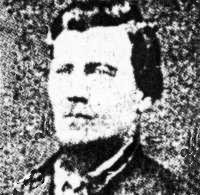
When the price of human misery and destruction is subtracted from war, little is actually left of the glory we so often admire in battle. It is true, however, that there are some who have tarnished the art of warfare more thoroughly than others. The Romans had Attila the Hun. Northwestern Europe, the Vikings. Men who made war, not on armies, but people. Women, children, helpless old men and cripples - buildings and works of architecture burned for no purpose but that of mindless destruction. Georgia and the Carolinas may whine of Sherman. Missouri of the Kansas Redlegs . . .but old families in West Tennessee spit forth one invective-like acid from a shattered battery - Hurst!
Lieutenant Colonel Fielding Hurst, 6th Tennessee Union Cavalry, hailed from that part of the Western District known as "The Nation." The Hurst Nation. A land settled by great tribes of the Hurst family and their related lines from Bethel Springs in McNairy County to Chickasaw State Park in Chester and Hardeman Counties. A land of rolling hills, red dirt, and sandy bottoms not unlike other areas situated along the Highland Ridge of West Tennessee. Homogeneous as yeomen farmers and shop keepers, politically Whiggish before the War, and radically Republican thereafter. A hotbed of Union sympathy and dedicated to little else but the wholesale obliteration of all their surrounding neighbors who tended to disagree. Hurst himself felt driven by divine mandate to slay the Phillistines, cleanse the land of rebels and like Joshua before him, to spare not even the ox nor its manger.
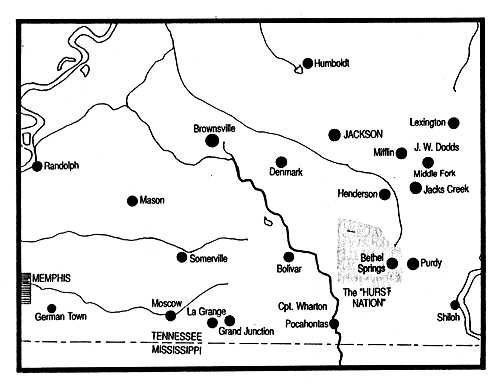
Fielding Hurst was born in 1818, the son of Elijah Hurst, and moved to the McNairy County area in the 1830's. Before the War he made his living as a surveyor, farmer and slaveholder. He voted against secession, as did four of his brothers. The other sibling, David, went against the tide and supported the Southern Confederacy.
Afterwards, having sided with scalawags and carpetbaggers, Fielding was appointed Circuit Judge by Governor Brownlow over Purdy, Lexington and various other spots outside the "Nation." One of the first public references to the "Nation" occured during this time. For a next day trial, Hurst ordered Sheriff Mitchell "to go back into the 'Nation' and bring back 25 men to serve as jurors." This happened regularly to ensure a guilty verdict against unreconstructed rebels in areas beyond the "Nation."
Governor Harris led Tennessee and her Provisional Army into the Confederacy, but the line of the Cumberland moved steadily southward. Henry, Donelson, Nashville . . . the Legislature moved to Memphis - and then the loss at Shiloh. Along with the life blood of valiant Albert Sidney Johnston flowed the hope of West Tennessee. Andrew Johnson became military governor of the occupied state, and the Tories rushed to form regiments. Five companies of the 6th Tennessee Union Cavalry were formed out of the "Nation," and Fielding Hurst, accompanied by his two negro servants, Lloyd and Sam, assumed command on August 14, 1862.
The progression from training to scouting to terrorism was swift, and only local legend preserves the names of the smallest hamlets torched during his forays. Eventually, he set out for Purdy, seat of McNairy County, and thoroughly Southern in sympathy. While the men paid the price of their convictions on the field, the women and children of Purdy paid their price in the scorching flame of their homes and places of worship. "It was Hurst who played the role of Nero in Purdy, even singing songs and praying while the churches were burning." On April 16, 1863, Col. E.W. Rice (US) wrote to his commander Maj. Gen. Oglisly: "Colonel Hurst's 1st W. Tenn Cavalry (6th Tn US) from Bolivar is at Purdy for the purpose of destroying property - has ordered the furniture removed from some of the houses and threatens to burn them. The colonel passed through line this morning but did not report to my headquarters, and I do not know by what authority he destroys the property."
Numerous early reports from Union command continually ask "Where is Hurst?" The same question was beginning to form on the silent lips of young mothers whose defenders marched with the Army of Tennessee (CS). The summer of 1863 found Hurst in Jackson, Tennessee There he ravaged and robbed the personal property of a Mrs. Newman, who filed a complaint with Federal authorities. After an intense investigation, Col. Hurst was found guilty of theft and charged $5,139.25 as recompense to Mrs. Newman. With things hot in Jackson, Hurst struck back out into rural West Tennessee. In August, Hurst surrounded and captured Captain Wharton and a portion of his men on the road from Purdy to Pocohontas. They were murdered. Ms. Emma Inman Williams writes in Historic Madison that they were buried as mile markers along that road. Mr. G. Tiliman Stewart, Henderson County historian until his death in 1986, remarked in 1977 that only the bodies were buried . . . the heads were placed on mile markers already existing on the road from Purdy to Lexington. In any event, the murders must have been horrible as various civilians wrote Confederate authorities about the matter. That of Mr. D. M. Wisdom reached Jefferson Davis himself.
By November 1863, Maj. Gen Hurlbut was becoming anxious about all the activity within his command. He wrote to Gen. Stevenson "Try to find out where Hurst is, and get him under your command. Both the 6th and 7th Tennessee have behaved badly." It seems, however, that it was only a matter of authority - in December, 1863 Hurst was granted "a roving commission . . . to 'grub up' West Tennessee" by Gen. William Sooy Smith.
The year of 1864 reads like a roll call of the damned. On January 1, a deformed and helpless cripple named Ree Doroughty - just 16-years-old was arrested and brutally murdered. Next the roving eye of Hurst was trained upon the men of Wilson's 21st and Newsome's 18th Cavalries (CS). On February 5, Pvt. Martin of the 21st was shot to death, and burial denied for four days. From there the 6th Tennessee rode on to Jackson, Tennessee, arriving on February 7.
Hurst decided he was due reimbursement for the fine levied against him by U.S. authorities in the matter concerning Mrs. Newman and demanded the $5,139.25 from the citizens of Jackson. Should the amount not be paid in full in five days, in either U.S. or Kentucky notes, the city of Jackson would be burned. On the 12th, a group of concerned citizens paid the levy-Hurst took the money and later burned the city.
Heading back towards the "Nation," Hurst captured three men of Newsome's 18th Cavalry: Lt. Joseph Stewart, Pvt. John Wilson, and Pvt. Samuel Osborn. Three days later their bodies were found in Haywood County shot to death. The month of March repeated the same agenda of burning and murder. On March 8, Pvt. Alex Vale of Co. H., Newsome's 18th, was arrested and shot in Madison County.
Lt. J.W. Dodds, CSA, August 20, 1843-March 9, 1864, Captured and brutally murdered. He was a constant member of the Baptist Church, a dutiful and affectionate brother and a gallant soldier. So reads his tombstone at Unity Baptist Church on Hwy 22A between Middlefork Village and Jacks Creek. He was an officer in Co. F., Newsome's 18th Cavalry, and had returned home on furlough. Most of the men in the 18th were either relatives or neighbors and young Willis Dodds was bright, brave and a favorite among the troops. A dispatch of Gen. Forrest reads "Pvt. Silas Hodges . . . states that he saw the body of Lt. Dodds very soon after his murder, and that it was horribly mutilated, the face having been skinned, the nose cut off, the under jaw disjointed, the privates cut off, and the body otherwise barbarously lacerated and most wantonly injured, and that his death was brought about by the most inhuman process of torture."
On March 10, Forrest wrote to Col. T. M. Jack, Asst. Adj. Gen., that "Hurst is still reported in West Tennessee, and a portion of Jackson and Brownsville have been burned by his men." The travesty compounded by Hurst, largely ignored by Federal Command as something between Southerners of divergent local politics, had now gained the attention of Bedford Forrest.
When asked to report by command on the conditions in West Tennessee, Forrest replied "From Tupelo to Purdy, the country has been laid waste, and unless some effort is made by the Mobile & Ohio RR or the Government, the people are bound to suffer for food. They have been, by the enemy and roving bands of tories, stripped of everything."
Forrest also asked that higher command deliver his reports on the atrocities committed by Hurst to the newspapers . . . "such conduct should be made known to the world."
Forrest also sent correspondence to Gen. Hurlbut and to Gen. Buckland on the conclusion of his investigation of the Hurst murders. He also requested that Hurst and the men responsible for these various crimes be turned over to Confederate authorities for criminal prosecution.
Though it seems that General Grierson convened a courtmartial, Hurst was never turned over to the Confederates. On March 22, 1864, Forrest had the following dispatch delivered throughout the surrounding territory:
"Whereas it has come to the knowledge of the Maj. Gen. commanding that Col. Fielding Hurst . . .has been guilty of wanton extortion upon the citizens of Jackson, Tennessee and other places guilty of depridation upon private property, guilty of house burnings, guilty of murders, both of citizens and soldiers of the Confederate States . . . I therefore declare . . . (them) outlaws, and not entitled to be treated as prisoners of war . . . ." Forrest was never to personally capture Hurst, although men of his command still skirmished with the 6th Tennessee. On April 20, Gen. James R. Chalmers wrote that Col Neely had ". . . drove Hurst hatless into Memphis, leaving in our hands all his wagons, ambulances, papers, and his mistresses, both black and white."
The rest of 1864 saw the same pattern as the first. In May, Hurst's men looted and burned Commerce, Mississippi. Again Forrest petitioned Federal Command for the surrender of Hurst, this time, in June to Maj. Gen. CC Washburn in Memphis, that Hurst ". . . deliberately took out and killed seven Confederate soldiers, one of whom they left to die after cutting off his tongue, punching out his eyes, splitting his mouth on each side to his ears and cutting off his privates." Meanwhile, Federal commanders such as Col. Waring at White Station, were worried about unexplained ordnance accounts and Hurst's refusal to discuss them. Col. E. W. Rice (US) was still concerned about the money extorted in Jackson, Tennessee "which he (Hurst) has not turned over to the government, but has it deposited for his own private benefit." In August, one Federal commander wrote headquarters demanding that "if Hurst is under my command that he be arrested and confined."
With pressure mounting from both Union and Confederate authorities, Hurst submitted his resignation "due to bad health" on December 10, 1864. No action was taken, although the resignation was received by higher command on January 8, 1865.
In May, Maj. Gen. Edward Hatch wrote to Headquarters, Fifth Cavalry Div. (US) "I learn a Mr. Chandler, calling himself a Captain, a brother-in-law of Fielding Hurst, is levying contributions upon the citizens of McNairy Co., Tennessee, amounting to $50,000. Hurst has already taken about $100,000 out of West Tennessee in blackmail when Col. of the 6th Tennessee . . . ." With the War over, Gen. Rosecrans granted Hurst a discharge through Special Order #8 on July 26, 1865, effectively backdated to his resignation.
Hurst never paid for his crimes during the War, and fanatics like Brownlow found Hurst the perfect purveyor of Reconstruction justice. His tenure as 12th Circuit Judge would fill another saga of vindictiveness, leaving those of us outside the "Nation" with nothing more than bitter memories-even after 125 years.
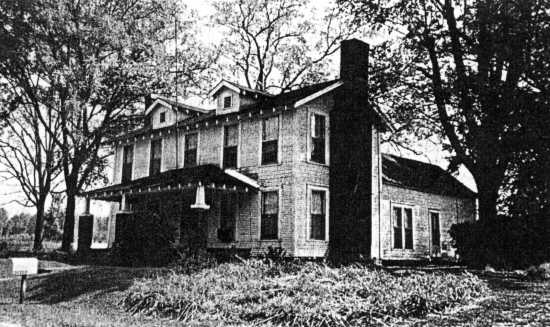
The Hurst Mansion in Purdy, where Fielding made his home until the late
1870's, was
erected in the 1850's. This is the only surviving 19th Century structure in the
area.
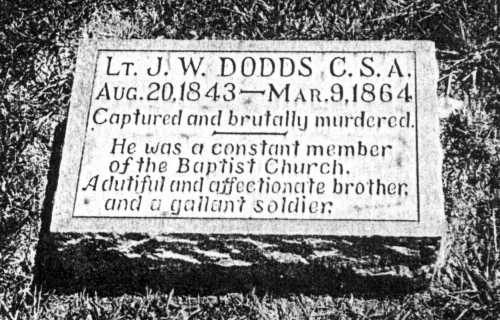
The grave of Lieutenant Dodds of Newsome's 18th Cavalry. The original
monument was so weathered that a new one was erected by a concerned
relative
several decades ago. Although not the size of the original monument, it
is
inscribed with the original wording and phrasing. Unity Baptist Church
(1848)
has been the resting place of over twenty Confederate officers and
soldiers
since the starting of the cemetery. Decoration Day is the Fourth Sunday
in May each year, a tradition carried on annually since the War.
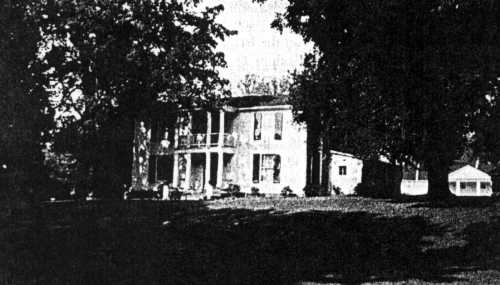
This house in Somerville was the antebellum home of Prof. Blakley, a
northern
music teacher. According to Ray Rosser, Tn. Div. Adj. and local historian,
Hurst
rode his mount up the steps of the house. The professor wrapped his arms
around
the Colonel's leg to plead the safety of his possessions due to the fact that
he had
"voted for Lincoln and was a northern man." Hurst replied, "you should
have
stayed the hell up there," demonstrating his universal disdain for
everyone
outside the "Nation."
Despair for the children
who lie now in bed.
The widow, the aged
the soldier who bled.
For out of the "Nation"
comes a sickness and curse -
God save us all
From the demon called Hurst.Like vandals of old
through our land they did ride
With Hunger and Death
always close by their side.
Came Terror, his herald -
but the wailing comes first . . .
We know he is coming,
That demon called Hurst.
Special thanks go to the author W. Clay Crook for providing this article to share. The article appeared in the March-April 1992 issue of Confederate Veteran. W. Clay Crook lives in the Middlefork Community of Henderson County and is contact for Crook family genealogy in West Tennessee.
